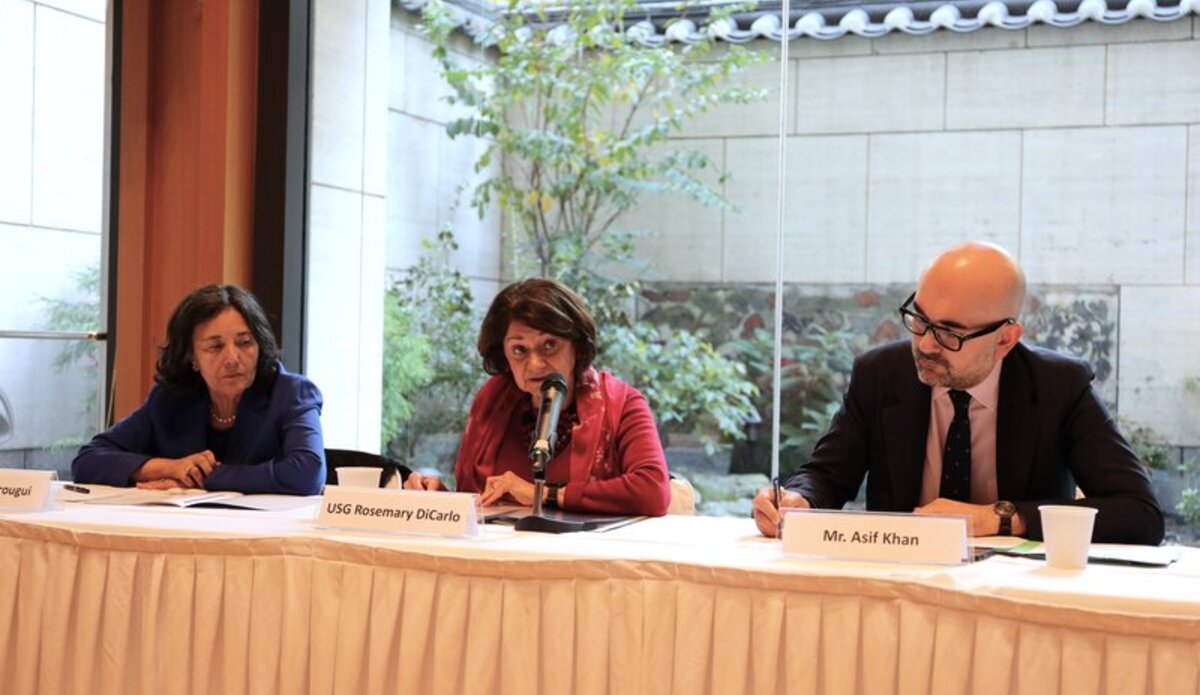Under-Secretary-General Rosemary A. DiCarlo's Remarks
at the Launch Event of the joint DPPA-OHCHR practice note entitled
"Enhancing the Quality and Effectiveness of Mediation Efforts through Human Rights"
New York, 7 November 2023
Thank you, Ambassador Hwang, for your hospitality today. I would also like to thank our distinguished panellists, Leila Zerrougui and Diego García-Sayán, for being with us.
I am pleased to introduce the joint DPPA-OHCHR practice note entitled “Enhancing the Quality and Effectiveness of Mediation Efforts through Human Rights.”
This project was motivated by the conviction that integrating human rights considerations into preventive diplomacy and mediation increases the odds of reaching more inclusive and just agreements.
We have worked closely with the Office of the High Commissioner for Human Rights to capture specific ways that working closely with human rights practitioners and integrating human rights considerations have opened space for mediation and good offices or strengthened on-going peace and political processes.
Although advocating human rights concerns can be perceived as constraining to mediators, our finding is that they in fact offer additional avenues of action.
For example, if a mediator reframes charged political narratives in the more technical language of human rights, this can lower the temperature in the negotiating room.
Or, if a mediation process is responsive to human rights concerns, as happened in El Salvador, this can increase popular support for negotiations. There, an initial human rights agreement paved the way for a UN human rights monitoring mission.
This contributed to a reduction of human rights violations, which increased the legitimacy of the negotiations, and, in turn, opened space for the parties to sign political and security-related agreements.
This practice note also grapples with the challenges of peacemaking today. It is increasingly rare for a comprehensive peace agreement to emerge from negotiations. This is partly due to increased geopolitical competition and fragmentation, as the Secretary-General underscored in his policy brief on A New Agenda for Peace.
Our mediation efforts need to be more innovative in tackling this challenge. For example, initial agreements on human rights can help establish new channels of communication between conflict parties and build confidence.
Mediators could also consider leveraging economic social and cultural rights as entry points, as they may be less divisive than political and security issues, particularly in geopolitically sensitive contexts.
Collaboration with human rights practitioners can help mediators enhance the inclusivity of the process. Human rights practitioners often enjoy the confidence of key civilian actors. Such contacts can be an asset to help advocate for the participation of women, minorities, youth and other marginalized groups as well as the inclusion of relevant provisions in peace agreements.
Likewise, human rights networks are invaluable to promoting a victim and survivor-centered approach.
In Colombia, the United Nations – alongside national partners – convened forums of victims and survivors and facilitated the participation of these groups in the negotiations between the Government and FARC. This contributed to the parties’ adoption of the Comprehensive System of Truth, Justice, Reparation and Non-Repetition.
Factual, credible, and impartial monitoring and reporting by human rights actors can also enhance the positive reputation of good offices efforts.
Periodic public human rights reports by the United Nations in Afghanistan, tracking civilian casualties by all parties and the treatment of detainees bolstered the impartial reputation of the UN. This later helped the credibility of UNAMA officials engaging the Taliban in Doha.
In Guinea, a commission of inquiry was quickly set up to during a joint AU-ECOWAS-UN mediation effort to investigate a massacre of civilians that had taken place.
Had no action been taken, this atrocity could have paralyzed the mediation process. The establishment of a separate commission of inquiry with a human rights mandate signaled that the violence would be investigated, allowing facilitation efforts to continue.
This practice note is an invitation to conceptualize new ways to design and facilitate more effective peacemaking through leveraging the complementarities between the fields of mediation and human rights.
This is in line with the Secretary-General’s commitment to bring together capacities across the peace and security, development, and human rights pillars in support of peace.
Let us remember that there cannot be any lasting peace without justice and accountability.
I look forward to the discussion today and your comments. Thank you.

